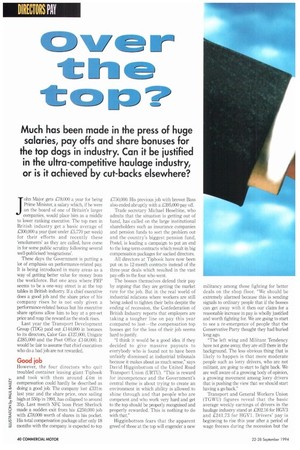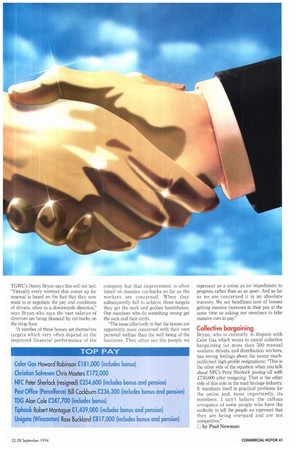Much has been made in the press of huge salaries,
Page 42

Page 43

If you've noticed an error in this article please click here to report it so we can fix it.
pay offs and share bonuses for the top dogs in industry. Can it be justified in the ultra-competitive haulage industry, or is it achieved by cut-backs elsewhere?
John Major gets £78.000 a year for being Prime Minister, a salary which, if he were on the board of one of Britain's larger companies, would place him as a middle to lower ranking executive. The top men in British industry get a basic average of £300,000 a year (just under £5.770 per week) for their efforts and recently these 'emoluments' as they are called, have come in for some public scrutiny following several well-publicised 'resignations'.
These days the Government is putting a lot of emphasis on performance-related pay It is being introduced in many areas as a way of getting better value for money from the workforce. But one area where PRP seems to be a one-way street is at the top tables in British industry. If a chief executive does a good job and the share price of his company rises he is not only given a performance-related bonus but his executive share options allow him to buy at a pre-set price and reap the reward as the stock rises.
Last year the Transport Development Group (TDG) paid out £144,000 in bonuses to its directors, Calor Gas £127,000, Unigate £285,000 and the Post Office £148,000. It would be fair to assume that chief executives who do a bad job are not rewarded.
Good job
However, the four directors who quit troubled container leasing giant Tiphook and took with them around fArn in compensation could hardly be described as doing a good job. The company lost £331m last year and the share price, once sailing high at 550p in 1991, has collapsed to around 35p. Last month NFC boss Peter Sherlock made a sudden exit from his £250,000 job with £78,000 worth of shares in his pocket. His total compensation package after only 18 months with the company is expected to top £750,000. His previous job with brewer Bass also ended abruptly with a £395,000 pay off.
Trade secretary Michael Heseltine, who admits that the situation is getting out of hand, has called on the large institutional shareholders such as insurance companies and pension funds to sort the problem out and the country's biggest pension fund, Postel, is leading a campaign to put an end to the long-term con-acts which result in big compensation packages for sacked directors.
All directors at Tiphook have now been put on to 12-month contracts instead of the three-year deals which resulted in the vast pay-offs to the four who went.
The bosses themselves defend their pay by arguing that they are getting the market rate for the job. But in the real world of industrial relations where workers are still being asked to tighten their belts despite the ending of recession, the Confederation of British Industry reports that employers are taking a tougher line on pay this year compared to last—the compensation top bosses get for the loss of their job seems hard to justify "I think it would be a good idea if they decided to give massive payouts to everybody who is found not to have been unfairly dismissed at industrial tribunals because it makes about as much sense," says David Higginbottom of the United Road Transport Union (URTU), This is reward for incompetence and the Government's central theme is about trying to create an environment in which ability is allowed to shine through and that people who are competent and who work very hard and get to the top should be properly recognised and properly rewarded, This is nothing to do with that."
Higginbottom fears that the apparent greed of those at the top will engender a new militancy among those fighting for better deals on the shop floor. "We should be extremely alarmed because this is sending signals to ordinary people that if the bosses can get away with it then our claim for a reasonable increase in pay is wholly justified and worth fighting for. We are going to start to see a re-emergence of people that the Conservative Party thought they had buried long ago.
"The left wing and Militant Tendency have not gone away, they are still there in the background. The less obvious thing that is likely to happen is that more moderate people such as lorry drivers, who are not militant, are going to start to fight back. We are well aware of a growing body of opinion, a growing movement among lorry drivers that is pushing the view that we should start having a go back,"
Transport and General Workers Union (TGWU) figures reveal that the basic average weekly earnings of drivers in the haulage industry stand at £202.16 for HGV3 and £241.73 for HGV1. Drivers' pay is beginning to rise this year after a period of wage freezes during the recession hut the
TGWU's Danny Bryan says this will not last: "Virtually every contract that comes up for renewal is based on the fact that they now want to re negotiate the pay and conditions of drivers, often in a downwards direction," says Bryan who says the vast salaries of directors are being financed by cut-backs on the shop floor.
"A number of these bosses set themselves targets which very often depend on the improved financial performance of the company but that improvement is often based on massive cut-backs as far as the workers are concerned. When they subsequently fail to achieve those targets they get the sack and golden handshakes. Our members who do something wrong get the sack and their cards.
''The issue effectively is that the bosses are apparently more concerned with their own personal welfare than the well being of the business. They often see the people we represent as a union as an impediment to progress rather than as an asset. And as far as we are concerned it is an absolute travesty. We see headlines now of bosses getting massive increases in their pay at the same time as asking our members to take massive cuts in pay."
Collective bargaining
Bryan, who is currently in dispute with Calor Gas which wants to cancel collective bargaining for more than 300 manual workers, drivers and distribution workers, has strong feelings about the recent muchpublicised high-profile resignations: "This is the other side of the equation when you talk about NFC's Peter Sherlock pissing off with .050,000 after resigning. That is the other side of this coin in the road haulage industry. It manifests itself in practical problems for the union and, more importantly, its members. I can't believe the callous arrogance of some people who have the audacity to tell the people we represent that they are being overpaid and are not competitive."
12 by Paul Newman
























































































